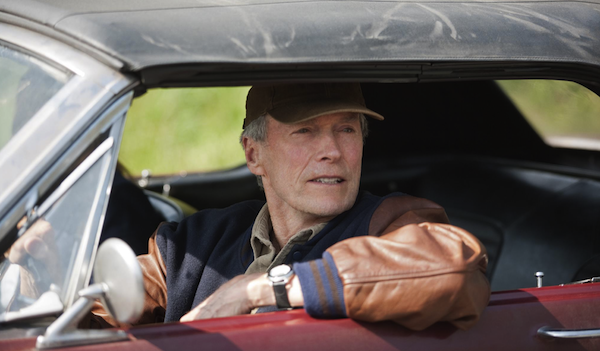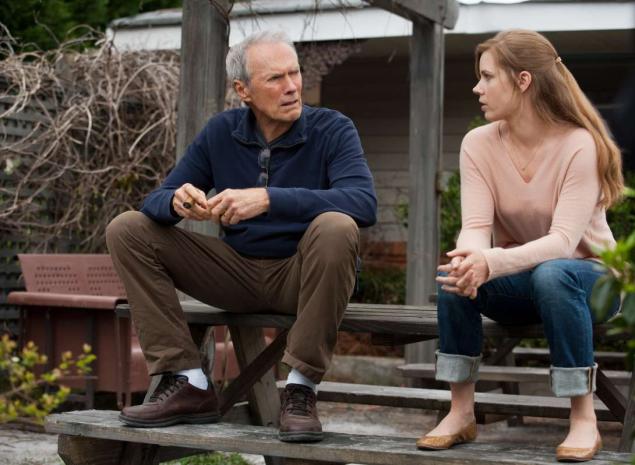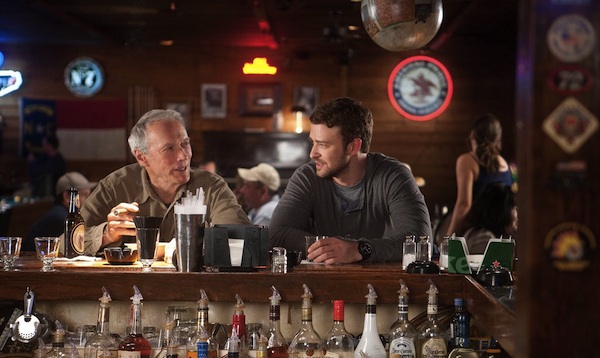Trouble with the Curve Review
Trouble with the Curve represents Clint Eastwood's first time on screen since he hollered his way through 2008's
Gran Torino, and if nothing else, it proves that some things will never change. Although his latest character, Gus Lobel, isn't as gruff as
Gran Torino's Walt Kowalski (the former, one would assume, doesn't mind all that much if you step on his lawn), he's still a craggily voiced sourpuss who almost inexplicably manages to win your heart over the course of his film.
Trouble with the Curve, however, doesn't have the same hard-boiled edge as
Gran Torino, nor does it have that film's bizarre and inappropriate sense of humor. It's a no-frills tale about father-daughter bonding, and while it'll warm your heart, it's damn near impossible in hindsight to single out an aspect of the film that's better than merely adequate.

Gus is, without question, America's greatest baseball scout, though his age is finally starting to take a toll on his work. His vision is failing him, and he's forced to rely on sounds and guesswork to tell his boss and close friend, Pete Klein (John Goodman), if a young man is worthy of the Major Leagues. Although Pete doesn't know the extent of Gus' problems, he suspects something is off, so he enlists Mickey (Amy Adams), Gus' daughter, to help the old man get through this crucial scouting trip.
Robert Lorenz — a longtime Eastwood collaborator and first-time director — navigates this ship through a sea of sloppy plot points. Gus' inane stubbornness, for example, comes across as artificial. Although it ultimately plays up to Eastwood's strengths as an actor, it feels less like an authentic character trait than it does a necessary plot point in Randy Brown's original-but-incredibly-unoriginal screenplay. Why not just go to the doctor, Gus?
In fact, very little about Lorenz's filmmaking style is noteworthy. One can't help but wonder what the film might look like through the eyes of Eastwood (probably similar albeit with a lot more neutral tones) or another veteran director. Coming off the heels of Bennett Miller's
Moneyball, a deceptively complex bit of baseball filmmaking,
Trouble with the Curve feels extra safe. And by and large, that's fine. The film is a simple piece of storytelling, but Lorenz's direction is so nondescript that it does detract a little from the final product.

The film is salvaged by two and a half great performances. Amy Adams wins the best-in-show award. She's done work like this before (albeit in different contexts), but her character's mix of assuredness and long-gestating disappointment comes across very believably. Eastwood, meanwhile, isn't foaming at the mouth as he did in
Gran Torino. His work here is more on par with his Oscar-nominated performance in
Million Dollar Baby. He's gruff, but not heartless, and his daughter brings emotions out in him that one can assume he hasn't expressed in decades.
The half-great performance comes from Justin TImberlake. He plays a hotshot young scout named Johnny Flanagan, a name that feels like it'd be more appropriate in an L.A.-based 1950s noir than a rural Georgian baseball movie, but that's one of his only real missteps. Timberlake, of course, has a very natural — occasionally overwhelming— charisma, and in this film, his Johnny connects with Adams' Mickey in a very appealing way. His relationship with Gus, however, is a little more complicated (the old man once scouted him when he was a promising pitcher). It doesn't really pay off in any satisfying way, mainly because we're more invested in the stories of Gus and Mickey, Mickey and Johnny, and Gus and his eyes.

That means all other subplots are total wastes. We spend a lot of time getting to know Joe Massingill's Bo Gentry, the selfish young prospect Gus is assigned to scout as the film begins. Matthew Lillard also plays a moderately important role as a third scout obsessed with numbers and technology (a la
Moneyball, in some ways). Both characters are comically one-dimensional and distract us way too much from what works.
Without a visual reason to exist,
Trouble with the Curve needs to knock it out of the park as far as storytelling goes. It doesn't, but thanks to Adams and Eastwood, it's still a benign, moderately satisfying experience.
 Gus is, without question, America's greatest baseball scout, though his age is finally starting to take a toll on his work. His vision is failing him, and he's forced to rely on sounds and guesswork to tell his boss and close friend, Pete Klein (John Goodman), if a young man is worthy of the Major Leagues. Although Pete doesn't know the extent of Gus' problems, he suspects something is off, so he enlists Mickey (Amy Adams), Gus' daughter, to help the old man get through this crucial scouting trip.
Robert Lorenz — a longtime Eastwood collaborator and first-time director — navigates this ship through a sea of sloppy plot points. Gus' inane stubbornness, for example, comes across as artificial. Although it ultimately plays up to Eastwood's strengths as an actor, it feels less like an authentic character trait than it does a necessary plot point in Randy Brown's original-but-incredibly-unoriginal screenplay. Why not just go to the doctor, Gus?
In fact, very little about Lorenz's filmmaking style is noteworthy. One can't help but wonder what the film might look like through the eyes of Eastwood (probably similar albeit with a lot more neutral tones) or another veteran director. Coming off the heels of Bennett Miller's Moneyball, a deceptively complex bit of baseball filmmaking,Trouble with the Curve feels extra safe. And by and large, that's fine. The film is a simple piece of storytelling, but Lorenz's direction is so nondescript that it does detract a little from the final product.
Gus is, without question, America's greatest baseball scout, though his age is finally starting to take a toll on his work. His vision is failing him, and he's forced to rely on sounds and guesswork to tell his boss and close friend, Pete Klein (John Goodman), if a young man is worthy of the Major Leagues. Although Pete doesn't know the extent of Gus' problems, he suspects something is off, so he enlists Mickey (Amy Adams), Gus' daughter, to help the old man get through this crucial scouting trip.
Robert Lorenz — a longtime Eastwood collaborator and first-time director — navigates this ship through a sea of sloppy plot points. Gus' inane stubbornness, for example, comes across as artificial. Although it ultimately plays up to Eastwood's strengths as an actor, it feels less like an authentic character trait than it does a necessary plot point in Randy Brown's original-but-incredibly-unoriginal screenplay. Why not just go to the doctor, Gus?
In fact, very little about Lorenz's filmmaking style is noteworthy. One can't help but wonder what the film might look like through the eyes of Eastwood (probably similar albeit with a lot more neutral tones) or another veteran director. Coming off the heels of Bennett Miller's Moneyball, a deceptively complex bit of baseball filmmaking,Trouble with the Curve feels extra safe. And by and large, that's fine. The film is a simple piece of storytelling, but Lorenz's direction is so nondescript that it does detract a little from the final product.
 The film is salvaged by two and a half great performances. Amy Adams wins the best-in-show award. She's done work like this before (albeit in different contexts), but her character's mix of assuredness and long-gestating disappointment comes across very believably. Eastwood, meanwhile, isn't foaming at the mouth as he did in Gran Torino. His work here is more on par with his Oscar-nominated performance in Million Dollar Baby. He's gruff, but not heartless, and his daughter brings emotions out in him that one can assume he hasn't expressed in decades.
The half-great performance comes from Justin TImberlake. He plays a hotshot young scout named Johnny Flanagan, a name that feels like it'd be more appropriate in an L.A.-based 1950s noir than a rural Georgian baseball movie, but that's one of his only real missteps. Timberlake, of course, has a very natural — occasionally overwhelming— charisma, and in this film, his Johnny connects with Adams' Mickey in a very appealing way. His relationship with Gus, however, is a little more complicated (the old man once scouted him when he was a promising pitcher). It doesn't really pay off in any satisfying way, mainly because we're more invested in the stories of Gus and Mickey, Mickey and Johnny, and Gus and his eyes.
The film is salvaged by two and a half great performances. Amy Adams wins the best-in-show award. She's done work like this before (albeit in different contexts), but her character's mix of assuredness and long-gestating disappointment comes across very believably. Eastwood, meanwhile, isn't foaming at the mouth as he did in Gran Torino. His work here is more on par with his Oscar-nominated performance in Million Dollar Baby. He's gruff, but not heartless, and his daughter brings emotions out in him that one can assume he hasn't expressed in decades.
The half-great performance comes from Justin TImberlake. He plays a hotshot young scout named Johnny Flanagan, a name that feels like it'd be more appropriate in an L.A.-based 1950s noir than a rural Georgian baseball movie, but that's one of his only real missteps. Timberlake, of course, has a very natural — occasionally overwhelming— charisma, and in this film, his Johnny connects with Adams' Mickey in a very appealing way. His relationship with Gus, however, is a little more complicated (the old man once scouted him when he was a promising pitcher). It doesn't really pay off in any satisfying way, mainly because we're more invested in the stories of Gus and Mickey, Mickey and Johnny, and Gus and his eyes.
 That means all other subplots are total wastes. We spend a lot of time getting to know Joe Massingill's Bo Gentry, the selfish young prospect Gus is assigned to scout as the film begins. Matthew Lillard also plays a moderately important role as a third scout obsessed with numbers and technology (a la Moneyball, in some ways). Both characters are comically one-dimensional and distract us way too much from what works.
Without a visual reason to exist, Trouble with the Curve needs to knock it out of the park as far as storytelling goes. It doesn't, but thanks to Adams and Eastwood, it's still a benign, moderately satisfying experience.
That means all other subplots are total wastes. We spend a lot of time getting to know Joe Massingill's Bo Gentry, the selfish young prospect Gus is assigned to scout as the film begins. Matthew Lillard also plays a moderately important role as a third scout obsessed with numbers and technology (a la Moneyball, in some ways). Both characters are comically one-dimensional and distract us way too much from what works.
Without a visual reason to exist, Trouble with the Curve needs to knock it out of the park as far as storytelling goes. It doesn't, but thanks to Adams and Eastwood, it's still a benign, moderately satisfying experience.